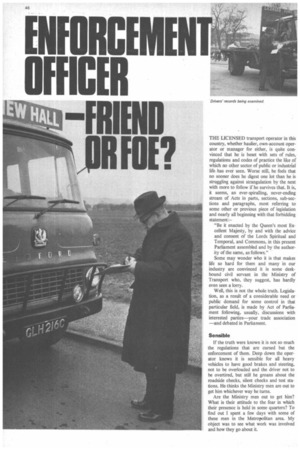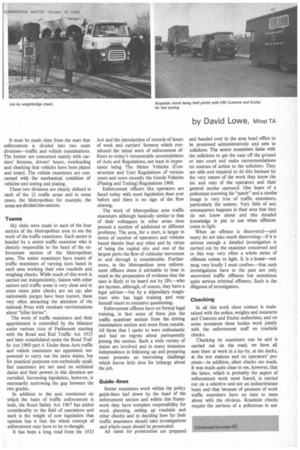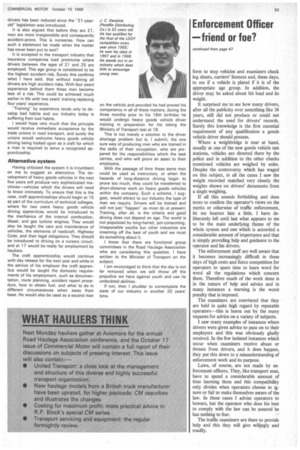INFORCEMEN OFFICER
Page 48

Page 49

Page 55

If you've noticed an error in this article please click here to report it so we can fix it.
FRIEND „PR FOE?
by David Lowe, Mlnst TA THE LICENSED transport operator in this country, whether haulier, own-account operator or manager for either, is quite convinced that he is beset with sets of rules, regulations and codes of practice the like of which no other sector of public or industrial life, has ever seen. Worse still, he feels that no sooner does he digest one lot than he is struggling against strangulation by the next with more to follow if he survives that. It is, it seems, an ever-spiralling, never-ending stream of Acts in parts, sections, sub-sections and paragraphs, most referring to some other or previous piece of legislation and nearly all beginning with that forbidding statement:—
"Be it enacted by the Queen's most Excellent Majesty, by and with the advice and consent of the Lords Spiritual and Temporal, and Commons, in this present Parliament assembled and by the authority of the same, as follows."
Some may wonder who it is that makes life so hard for them and many in our industry are convinced it is some deskbound civil servant in the Ministry of Transport who, they suggest, has hardly even seen a lorry.
Well, this is not the whole truth. Legislation, as a result of a considerable need or public demand for some control in that particular field, is made by Act of Parliament following, usually, discussions with interested parties—your trade association —and debated in Parliament.
Sensible
If the truth were known it is not so much the regulations that are cursed but the enforcement of them. Deep down the operator knows it is sensible for all heavy vehicles to have good brakes and steering, not to be overloaded and the driver not to be overtired, but still he groans about the roadside checks, silent checks and test stations. He thinks the Ministry men are out to get him whichever way he turns.
Are the Ministry men out to get him? What is their attitude to the fear in which their presence is held in some quarters? To find out I spent a few days with some of these men in the Metropolitan area. My object was to see what work was involved and how they go about it. It must be made clear from the start that enforcement is divided into two main divisions—traffic and vehicle examinations. The former are concerned mainly with carriers' licences, drivers' hours, overloading and checking that vehicles have been plated and tested. The vehicle examiners are concerned with the mechanical condition of vehicles and testing and plating.
These two divisions are clearly defined in each of the 12 traffic areas and in some cases, the Metropolitan for example, the areas are divided into sectors.
Teams My visits were made to each of the four sectors of the Metropolitan area to see the work of the traffic examiners. Each sector is headed by a senior traffic examiner who is directly responsible to the head of the enforcement section of the Metropolitan area. The senior examiners have teams of traffic examiners of varying sizes based in each area working their own roadside and weighing checks. While much of this work is carried out independently, liaison with other sectors and traffic areas is very close and in some cases joint checks are set up; also nationwide purges have been known, these very often attracting the attention of the national Press with resultant recriminations about "killer lorries".
The work of traffic examiners and their appointment is controlled by the Minister under various Acts of Parliament starting with the Road and Rail Traffic Act 1933 and later consolidated under the Road Traffic Act 1960 part 4. Under these Acts traffic and vehicle examiners are appointed, empowered to carry out the same duties, but for practical purposes non-technically qualified examiners are not used on technical duties and their powers in this direction are curtailed. Increasing legislation, however, is necessarily narrowing the gap between the two grades.
In addition to the acts mentioned on which the basis of traffic enforcement is built, the Road Safety Act 1967 has added considerably to the field of operations and such is the weight of new legislation that opinion has it that the whole concept of enforcement may have to be re-thought.
It has been a long road from the 1933 Act and the introduction of records of hours of work and carriers' licences which constituted the initial work of enforcement officers to today's innumerable accumulations of Acts and Regulations, not least in importance being The Motor Vehicles (Construction and Use) Regulations of various years and more recently the Goods Vehicles (Plating and Testing) Regulations 1968.
Enforcement officers like operators are faced today with more legislation than ever before and there is no sign of the flow abating.
The work of Metropolitan area traffic examiners although basically similar to that of their colleagues in other areas does present a number of additional or different problems. The area, for a start, is larger in terms of number of operators and vehicles based therein than any other and by virtue of being the capital city and one of the largest ports the flow of vehicular movement to and through is considerable. Furthermore, in the Metropolitan area enforcement officers deem it advisable to bear in mind in the preparation of evidence that the case is likely to be heard not by JPs—who are laymen, although, of course, they have a legal adviser—but by a stipendiary magistrate who has legal training and may himself resort to extensive questioning.
Enforcement officers have no formal legal training, in fact some of them join the traffic examiner section from the driving examination section and some from outside. All those that I spoke to were enthusiastic and had no regrets about permanently joining the section. Such a wide variety of duties are involved and in many instances independence in following up and preparing cases presents an interesting challenge which leaves little time for lethargy about the job.
Guide-lines
Senior examiners work within the policy guide-lines laid down by the head of the enforcement section and within this framework they have complete responsibility for work planning, setting up roadside and other checks and in deciding how far their traffic examiners should take investigations and which cases should be prosecuted.
All cases for prosecution are prepared
and handed over to the area head office to be processed administratively and sent to solicitors. The senior examiners liaise with the solicitors to get the case off the ground or into court and make recommendations on courses of action to the solicitors. They are able and required to do this because by the very nature of the work they know the ins and outs of the operators and their general modus operandi. One hears of a policeman knowing his "patch" and a similar image is very true of traffic examiners, particularly the seniors. Very little of any consequence happens in their area that they do not know about and this detailed knowledge is put to use when offences come to light.
When an offence is discovered—and many do not take much discovering—if it is serious enough a detailed investigation is carried out by the examiner concerned and in this way very often a whole series of offences comes to light. It is a boast—not sung very loudly I must confess—that such investigations have in the past not only uncovered traffic offences but sometimes quite serious criminal offences. Such is the diligence of investigators.
Checking In all this work close contact is maintained with the police, weights and measures and Customs and Excise authorities, and on some occasions these bodies work jointly with the enforcement staff on roadside checks.
Checking by examiners can be and is carried out on the road; we have all seen them at work in a lay-by, at the docks, at the test stations and on operators' premises—in addition, silent checks are made. It was made quite clear to me, however, that the latter, which is probably the aspect of enforcement work most feared, is carried out on a selective and not an indiscriminate basis and that because of pressure of work traffic examiners have no time to mess about with the obvious. Roadside checks require the services of a policeman in uni form to stop vehicles and examiners check log sheets, carriers' licences and, these days, to see if a vehicle is plated if it is of the appropriate age group. In addition, the driver may be asked about his load and its weight.
It surprised me to sec how many drivers, after all the publicity over something like 36 years, still did not produce or could not understand the need for drivers' records. Surely this knowledge is the first essential requirement of any qualification a goods vehicle driver should possess.
Where a weighbridge is near at hand, usually at one of the new goods vehicle test stations, vehicles are directed there by the police and in addition to the other checks mentioned vehicles are weighed by axles. Despite the controversy which has waged on this subject, in all the cases I saw the weight recorded matched very closely the weights shown on drivers' documents from a single weighing.
If all this sounds forbidding and does more to confirm the operator's views on the merits or otherwise of traffic enforcement, let me hearten him a little. I have deliberately left until last what appears to me to be the main underlying theme of the whole system and one which is accorded a considerable amount of importance and that is simply providing help and guidance to the operator and his drivers.
The enforcement staff are well aware that it becomes increasingly difficult in these days of high costs and fierce competition for operators to spare time to learn word for word all the regulations which concern them. Therefore much of the work done is in the nature of help and advice and in many instances a warning is the worst penalty that is imposed.
The examiners are convinced that they are held in quite high regard by reputable operators—this is borne out by the many requests for advice on a variety of subjects.
I saw many examples of instances where drivers were given advice to pass on to their employers and this was obviously gladly received. In the few isolated instances which occur when examiners receive abuse or threats from drivers, and it does happen, they put this down to a misunderstanding of enforcement work and its purpose.
Laws, of course, are not made by enforcement officers. They, like transport men, have to spend a considerable amount of time learning them and this compatibility only divides when operators choose to ignore or fail to make themselves aware of the law. In these cases I advise operators to beware, but the operator who does his best to comply with the law can be assured he has nothing to fear.
The traffic examiners are there to provide help and this they will give willingly and readily.
























































































































